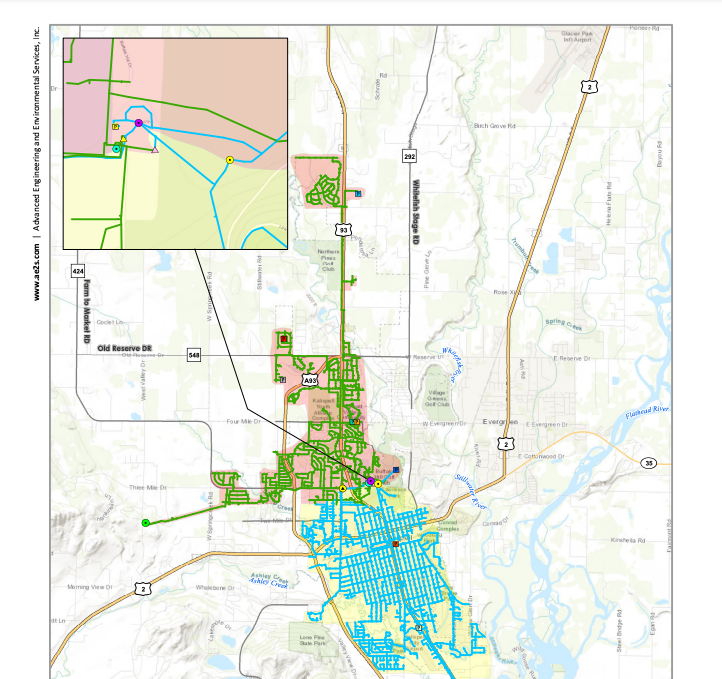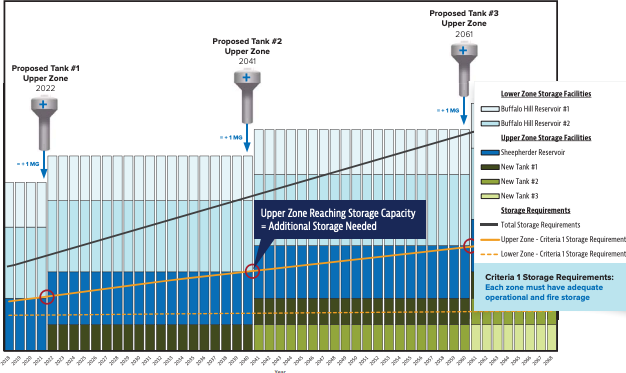What’s Going Up on Highway 93?
The new 160-foot-tall tank is part of a greater project to address water supply, storage and distribution in the Kalispell area
By Micah Drew
Along the east side of Highway 93, just north of Rose Crossing, construction crews are raising a concrete pedestal that will eventually hold a 160-foot-tall, 1-million-gallon water storage tank for the city of Kalispell.
The new tank is part of a greater project to address water supply, storage and distribution in the Kalispell area. In addition to the elevated tank, the project includes construction of three wells — one at the same site as the tank, one along Four Mile Drive west of Stillwater Road, and one near the entrance of the Buffalo Hills Golf Course in town — and a new control valve building on West Spring Creek Road.
A 2018 update to the water facility plan for the city found that Kalispell meets state-mandated water storage requirements but “just barely,” said deputy public works director Keith Haskins. “We needed to be planning for additional storage, especially in the upper pressure zone to serve the growth coming into Kalispell.”
The city’s water system is divided into two parts: the lower-pressure zone, which comprises the older parts of Kalispell south of Buffalo Hill and Liberty Street, and the upper-pressure zone which covers everything to the north and west of Buffalo Hill. Most of the new growth in the Kalispell area has occurred in the upper-pressure zone, which stretches as far north as Silverbrook Estates.

There are currently four storage facilities for the municipal water supply — two in-ground reservoirs built into Buffalo Hill, which hold 1.7 million gallons and 2.7 million gallons, respectively, as well as the 100,000-gallon elevated Buffalo Hill tank and a 2-million-gallon reservoir on Sheepherder Hill west of Kalispell.
The 2018 water facility plan found average daily water usage in 2016 was around 3.7 million gallons per day, with a maximum of 8.7 million gallons per day during the summer peak. Extrapolating for future population growth, the planning document estimated the average daily demand would increase to 4.4 million gallons by 2023, and 5.7 million by 2033.

“We’re keeping our finger on the growth of the population,” Haskins said. “We don’t want to get into a position where we’re playing catchup. We want to be proactive, and that’s where we’ll make best use of our funds, rather than having to react in an emergency situation.”
Plans for additional storage sites and wells began to take shape in 2020, and the bids for the current construction phases went out in early 2023. Construction contracts for the water storage tank were awarded to Landmark Structures, an out-of-state firm that specializes in elevated tanks, while three other phases of construction, including two of the wells, was awarded to S & L Underground.
The total project cost is $33 million. Kalispell received a Montana State Revolving Fund Loan, partially funded through the federal Bipartisan Infrastructure Bill negotiated by U.S. Sen. Jon Tester, D-Mont, to cover a majority of the construction costs, as well as additional grant funding from the American Rescue Plan Act.
Construction crews began work on the base of the tower in September and started building vertically last month.
Upon completion, the concrete tower pedestal will stand 120 feet high and the composite tank will add an additional 40 feet. At that height, the water tank matches the elevation of the storage tank on Sheepherder Hill west of town.
In addition to adding to Kalispell’s overall storage capacity, the new tank will add a level of redundancy into the water system in case another reservoir or a pipeline was ever compromised, Haskins said.
Crews have constructed around 80 feet of the tank’s pedestal so far and are expected to finish work on that portion this year, weather permitting. The three new wells are expected to come online by next summer, while construction on the water tank itself will last through 2024.
Haskins said long-term plans include upgrading the current water tower on Buffalo Hill to a 1-million-gallon tank and building another reservoir near Kidsports; however, he said the city is still a ways out from those projects.
“We’re just trying to look towards the future and keep the water flowing,” Haskins said.
